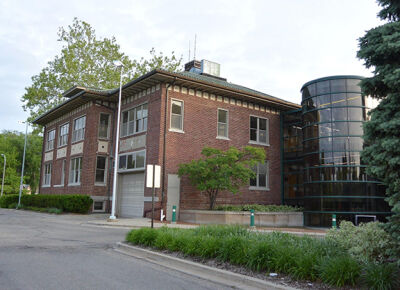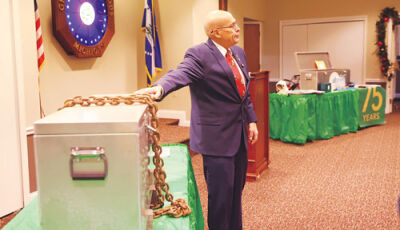GROSSE POINTE PARK — Power outages are so frequent in Grosse Pointe Park that the whir of generators is a common sound around the homes fortunate enough to have them.
The power outage problem was one that DTE officials addressed publicly during an Aug. 14 Park City Council meeting and will be the subject of an upcoming event. DTE officials will be on hand to answer questions and address concerns that Park residents have from 5 to 7 p.m. Sept. 13 at Windmill Pointe Park.
The council meeting appearance came in the wake of the latest outage to hit parts of the city after a powerful storm tore through the Pointes July 26; the National Weather Service has since confirmed that a funnel cloud was spotted over Grosse Pointe Farms that day.
“We want to talk with the residents,” said Barbara Rykwalder, manager of corporate and government affairs for DTE Energy. “It will be a great opportunity for the residents to come out and communicate one on one with DTE.”
DTE officials said they are working to improve the system.
“We understand how difficult it is when you don’t have power,” said Markeith Poteat, DTE’s regional customer operations director for the southeast region. “We know how it impacts local businesses and residents. … I assure you we are doing everything possible to continue to improve reliability.”
Rishad Hafiz, a supervising engineer for DTE, said the Park is served by two substations — the Wayburn substation and the Denver substation. He said those on the Denver substation experience more power outages. Hafiz said the Wayburn substation was upgraded a couple of years ago and has shown “significant circuit improvement” since then. He said DTE plans to eventually upgrade all the circuits, but it will take time.
Tree trimming is something DTE does on a scheduled basis to reduce outages, but Hafiz said they can only trim trees that are on a DTE easement and even then, they need to have permission from the resident to go on the property and trim them.
Hafiz said tree trimming in the Park started in 2021 and took two years to complete. He said they typically return every five years to trim trees.
City Councilman Vikas Relan was concerned that the five-year interval might be “too long of a time” to go between trimming cycles in the Park, given the number, size and age of the city’s tree population. Hafiz said he could go back and discuss whether more frequent trimming would reduce outages, but said that trees outside DTE’s trimming area are actually the ones that cause the most outages.
Relan said the area of the Park served by the Denver substation had already experienced approximately four or five power outages just this year, “and that’s quite ridiculous. … There’s a lot of revenue coming to DTE. They need to start pumping it back (into the community).”
City Councilman Max Wiener told DTE officials to let the city know if they needed help reaching residents with regard to tree trimming.
“At the end of the day, we want to improve the broader system,” Wiener said. “Anything we can do to help that along is critical.”
Wiener thanked the DTE representatives for coming to the meeting.
“Weather’s weather — we understand,” Wiener said. “But communication — that’s the single biggest thing our community is looking for.”
City Councilwoman Christine Gallagher asked about DTE moving its power lines underground, something she said she did at her own home, at her personal cost.
“This could, in the future, alleviate a lot of the outages,” Gallagher said.
Poteat said burying lines “is a long process.”
“During a storm, we’re trying to get customers restored as soon as possible,” Poteat said.
He also observed that overhead lines are cheaper.
“We’re regulated by the (Michigan Public Service Commission) to provide cheap, reliable service,” Poteat said.
Rykwalder said DTE hopes to one day relocate its lines underground, but because of the cost, this is expected to take time. She said they are doing a pilot program soon in part of Detroit, though — something Park officials found encouraging.
Projects that might be years in the making are hardly reassuring to residents dealing with power outages on a regular basis now.
Park resident Charles H. Brower II, a law professor at Wayne State University, provided the council with data and documents showing the number and length of power outages in his area. Since January 2023, he said, they’ve suffered seven outages, which totaled 130.75 hours without electricity. Brower’s area is served by the Denver substation.
“That is roughly 14 times the average for the state of Michigan, an amount that is shockingly outside the norm,” Brower said. “And we still have four and a half months to go (in the year).”
Five of these outages occurred during the winter, when temperatures were in the teens. Brower said he and his neighbors were worried their pipes might freeze and burst, given that some of these outages lasted about one to two days.
A sump pump used by one of Brower’s neighbors has failed during some outages, causing water to accumulate in her basement, while another neighbor had to replace the controller on her range with a used one, at a cost of $1,500. And these repairs don’t even begin to take into account the spoiled refrigerated and frozen food that Brower and his neighbors have had to discard after prolonged outages.
Generators are an option, and Brower said some of his neighbors have gotten them, but he said whole-home generators cost about $10,000 to $20,000 to purchase and install, and then another $100 to $200 per day to operate, depending on the kind of fuel they use.
Given that DTE’s revenues are strong — Brower cited a DTE report that showed revenues were up by more than 28% in 2022 — he feels the utility can afford to invest more in making necessary infrastructure improvements that would improve reliability for people like him and his neighbors.
Park residents aren’t just bearing the costs of power outages by way of damaged appliances and ruined food. The fact that his area experiences so many power outages is likely to have a negative impact on property values as well, Brower said.
 Publication select ▼
Publication select ▼




















